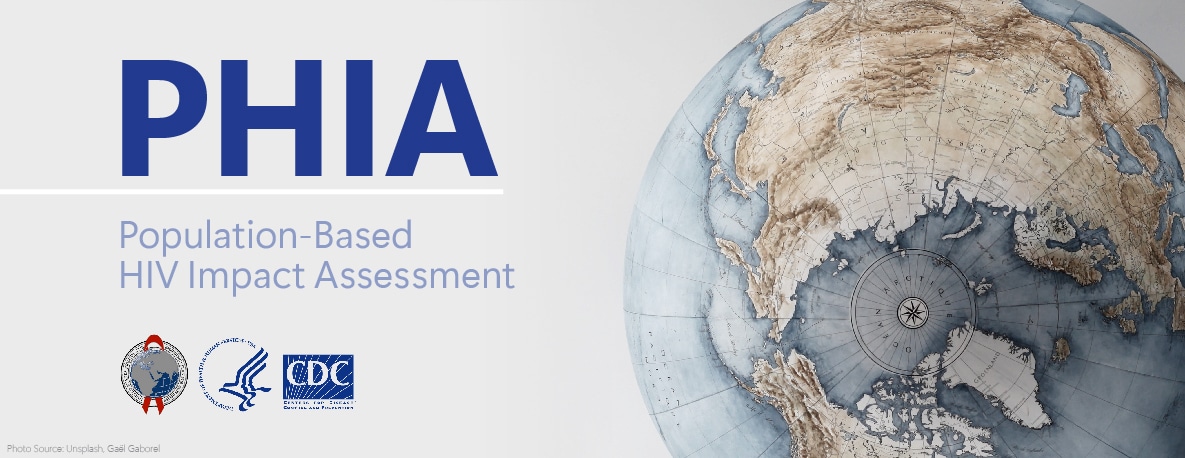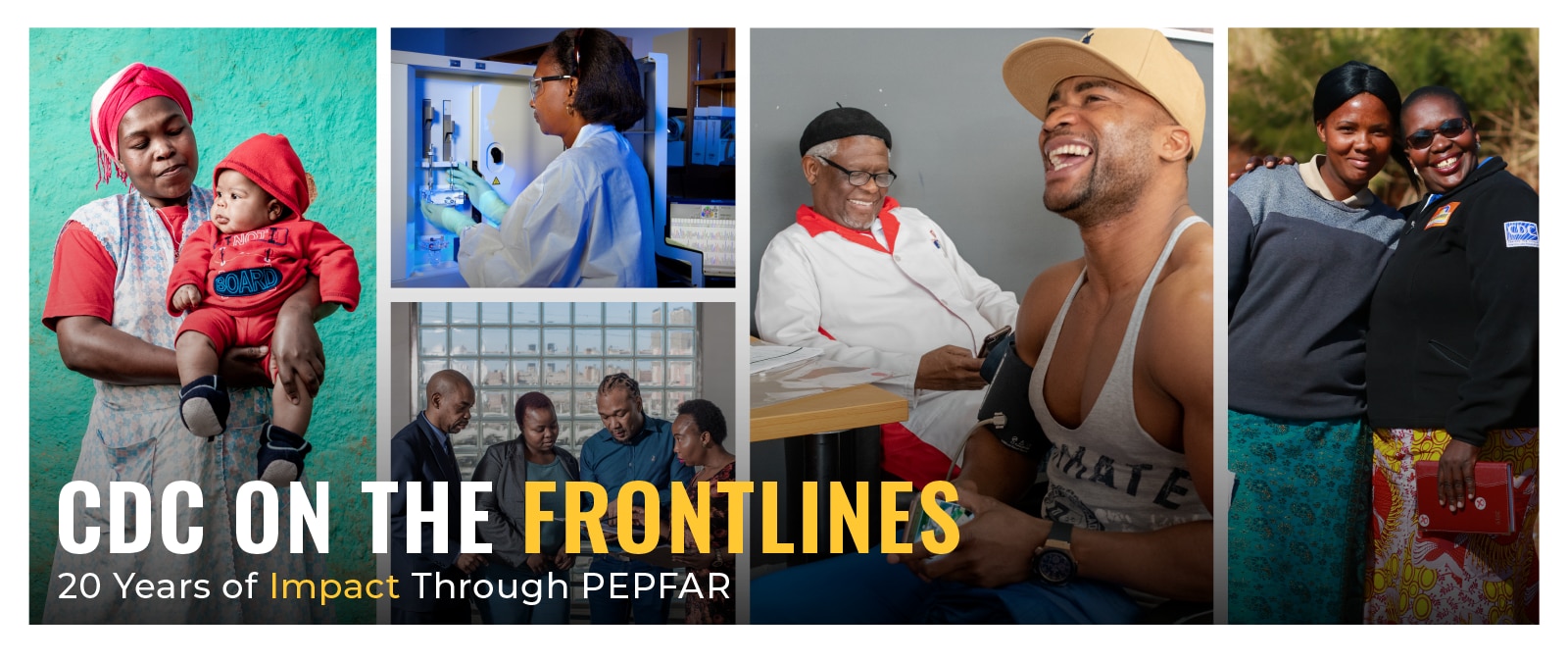Nigeria Country Profile

Nigeria Country Profile
Discover more about CDC’s work in Nigeria by viewing our detailed country profile
Country Overview
Established in 2001, CDC’s Nigeria office provides technical leadership and assistance to the Ministry of Health and implementing partners to strategically scale-up HIV and tuberculosis (TB) testing, treatment, and prevention; build in-country capacity for high-quality national laboratory services; and strengthen epidemiology, disease surveillance, laboratory, blood safety, operations research, and workforce capacity. Additionally, CDC provides technical guidance to ensure that TB/HIV collaborative activities, as well as TB infection control programs, are strengthened.
Per Capita GNI
$2,140
(2022)
Population (million)
218.54
(2022)
Under 5 Mortality
110.8/1,000 Live Births
(2021)
Life Expectancy
52.7 Years
(2021)
Estimated HIV Prevalence
N/A
(Ages 15-49): (2022)
Estimated AIDS Deaths
N/A
(Age≥15) (2022)
TB Treatment Success Rate
90%
(2020)
Estimated TB Incidence
219/100,000
(2021)
Estimated Orphans Due to AIDS
N/A
(2022)
TB patients with known HIV-status who are HIV-positive
5.9%
(2021)
Reported Number Receiving Antiretroviral Therapy (ART)
N/A
(Age≥15) (2022)
Strategic Focus
Active Strategic Scale-up of Comprehensive HIV Services: The Centers for Disease Control and Prevention (CDC) office in Nigeria was established in February 2001, and provides technical leadership and assistance to the Ministry of Health (MOH) and implementing partners to scale up HIV testing, treatment, and prevention of mother-to-child transmission of HIV (PMTCT) services.
Strengthening Laboratory Systems and Networks: CDC provides technical leadership and assistance to build in-country capacity for high-quality HIV and Tuberculosis (TB) diagnostic and monitoring, and to support the development of a national reference public health laboratory system for HIV, TB, and other diseases.
Strengthening Public Health Systems: CDC assists the MOH to strengthen epidemiology, surveillance, laboratory, medical informatics, operations research, and workforce capacity – essential components for a strong, sustainable public health system.
Key Activities and Accomplishments
Prevention of Mother-to-Child HIV Transmission (PMTCT) Support: Working with local stakeholders and partners, 1,702 sites offering PMTCT services were established between October 2016 and September 2017. According to PEPFAR Nigeria data, between October 2016 and September 2017, HIV testing and counseling were provided to about 1 million pregnant women and antiretroviral therapy (ART) to 24,445 HIV-positive pregnant women to prevent mother-to-child transmission.
HIV Testing Services (HTS) and Antiretrovirus Treatment (ART) Services: CDC, through its implementing partners, provides high quality HIV testing services and HIV treatment and support services. Between October 2016 and September 2017, CDC and its partners provided HIV testing services to about 5 million people across Nigeria. Of this, 109,275 were diagnosed with HIV infection and referred for treatment. (PEPFAR Nigeria, 2017) At the end of FY17 (September 30, 2017), 480,207 patients were receiving ART, while almost 250,000 Orphan and Vulnerable Children were provided with a minimum of one care service in the last quarter of FY17. (PEPFAR Nigeria, 2017)
TB/HIV Integration: CDC continues to provide technical guidance to partners to ensure TB/HIV collaborative activities are strengthened. Between October 2016 and September 2017, CDC supported partners screened about 477,921 people living with HIV for TB signs and symptoms; 4,452 TB patients were diagnosed with HIV and placed on ART HIV therapy. (PEPFAR Nigeria, 2017)
TB Infection Prevention and Control: CDC scaled up a comprehensive TB infection control program called TB BASICS across all PEPFAR supported facilities in Nigeria. The ongoing TB BASICS program helps protect healthcare workers and patients from healthcare-associated infection from TB and other airborne infection, and the MOH has incorporated TB BASICS into the national TB/HIV training modules for Healthcare workers.
National AIDS Impact & Indicator Survey (NAIIS): CDC, through its implementing partner University of Maryland (UMB), is carrying out the largest HIV impact survey (target sample size = 170,000) in the country’s history to measure HIV burden and viral suppression nationally and at each of Nigeria 36 states and the Federal Capital Territory.

Tracking PEPFAR Impact Toward Global Targets
The U.S. Centers for Disease Control and Prevention (CDC) works with partners including host countries, local implementing partners, faith-based organizations, and other community-based organizations to measure progress towards HIV epidemic control in countries supported by the U.S. President’s Emergency Plan for AIDS Relief (PEPFAR).

HIV Treatment Surge in Nigeria Doubles the Number of People on Treatment in Two Years
Nigeria, the most populous country in Africa, is home to the fourth largest HIV epidemic in the world and one of the highest rates of new infections in sub-Saharan Africa. For decades, the country was unable to effectively find those living with HIV and get them started on treatment. As a result, year after year, they were unable to meet the UNAIDS’external icon goals for HIV epidemic control.

CDC On the Frontlines
Over the past 20 years, the U.S. President’s Emergency Plan for AIDS Relief (PEPFAR) has saved millions of lives as a leader in the global response to two of the world’s deadliest infectious diseases – HIV and TB. As a key implementing agency of the U.S. President’s Emergency Plan for AIDS Relief (PEPFAR), CDC is at the forefront of these global efforts to treat and prevent these diseases.